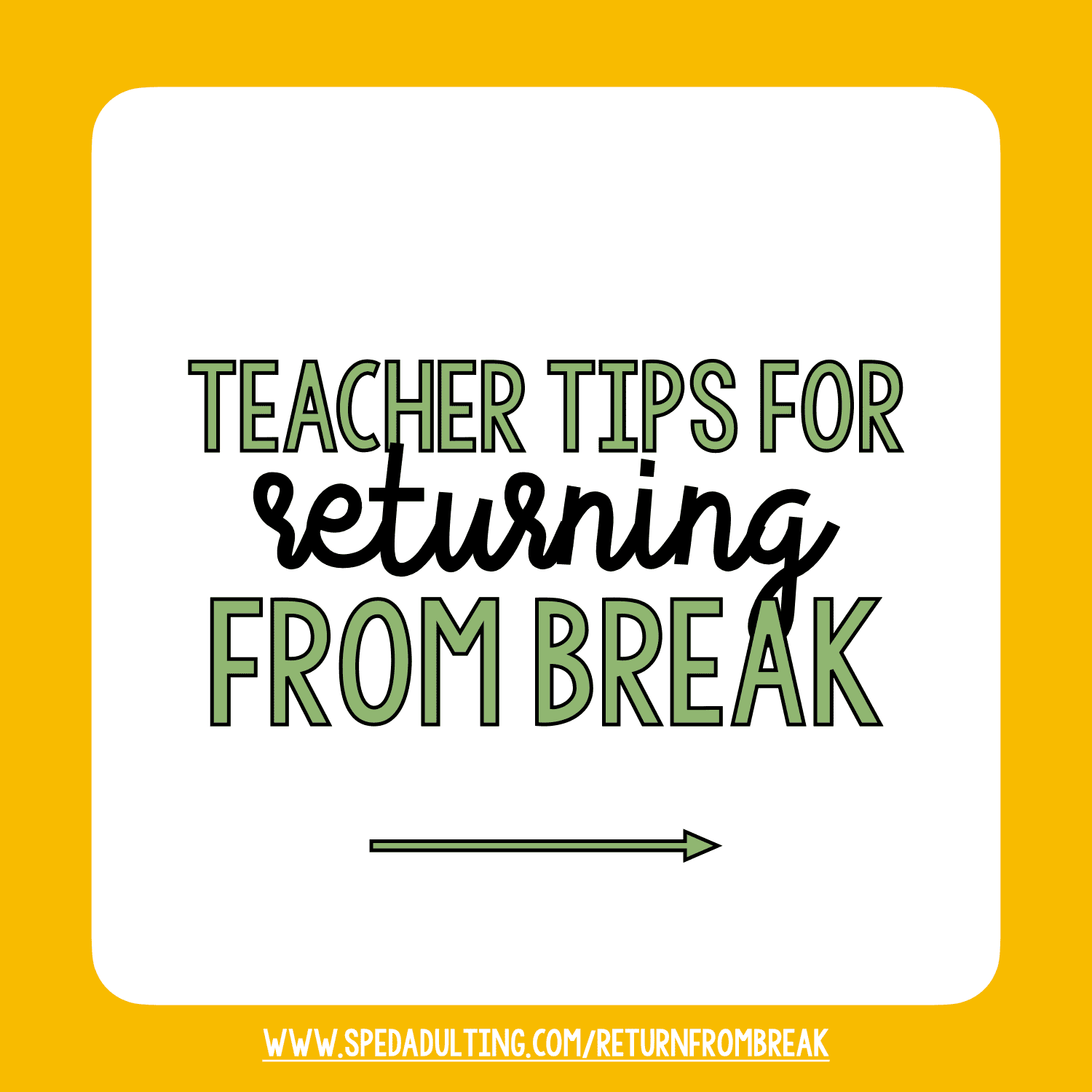Returning from a break or vacation can be depressing. It was nice getting used to your routine of relaxing, self-care, fun things, sleeping in, seeing the world, exercising, and running errands when there’s less traffic…ok I’ll stop there, I could go on about how amazing breaks are. Anyways, where I’m going with this is that it can be stressful returning to work that first day and getting back into the old routine. It doesn’t have to be that way though – here are some tips to help you seamlessly transition back into the classroom after a break in a better mood and ready to conquer the back-to-work scaries!
1. Make a list
Make a list of the things you need to do in order to get back into the swing of things. Lists help you visually plan, mentally prepare, and decrease the stress of “forgetting” something. If you can, try and make a running list of the things you will need to do BEFORE you leave for break. Sometimes it can be an added stress if you wait until the night before to make a list, you might forget some things, feel rushed or overwhelmed by the things piling up on your list. Start you list early and then maybe add to it at the end of your break if needed (but try and avoid doing any work over your if possible, that is the whole point of your break!).
2. List is “Work in Progress”
Repeat after me: “It’s ok I don’t tackle everything on my list right away.” If you’re like me – I’m a list person and I put every little thing on a list, so my lists tend to pile up pretty quickly. Don’t stress yourself out even more by thinking you HAVE to complete everything by the first Monday you return. Put a start next to the tasks that need to be completed first, or write down their deadlines to help you mentally prepare. Everything else on that list can happen in it’s own time.
3. Rules & routines over academics
Just like you – students have been in a whole new routine on their break. The first day(s) back from a break are a good opportunity to revisit rules and routines with students. Many of our students thrive on routine and structure so this is a really important step to decreasing the chaos that might ensue the first day/week back.
Focusing on routines might mean you won’t get to academics/IEP goals right away, and that’s ok. If you class is a hot mess because your rules and routines are not in place, then it’s going to be really hard to teach academics and work on goals anyways, so take care of the routine stuff first then you can get to the real work.
4. Don’t take student behaviors personally
Transitioning back from break and back to different routines is hard. This can bring up a lot of big feelings. On top of this, a student’s break may not have been pleasant – everyone’s situation is a bit different, and being with/without family, not being able to travel…etc can lead to an unpleasant time for your students.
5. Give students frequent breaks
Piggybacking on not taking student behaviors personally – give them more breaks than you would normally. Going from not doing any work to having to sit at a desk and pay attention is a lot. Ease into activities, and maybe do something fun for the first day back.
6. Give yourself grace
Transitioning back to school/work is not easy on anyone! Give yourself AND your staff grace. While you might have to be more on top of things for your students and staff, don’t beat yourself up if things seem to be a little crazy or if you aren’t completing as many assignments the first day/week back. Ease into those academics and give yourself a nice little warm up before getting into the full swing of things.
7. Postpone that diet
Whether you are returning from winter break and it’s a New Year’s resolution, or you just spent a whole week at an all-inclusive resort stuffing your face at the buffet, many of have the intention of eating healthier and there’s usually a motivation to do so after a break. It just seems like a good time to “start new”. If this is you – that’s great, I totally encourage you to go on a diet or cleanse if you want to be healthier BUT, think about maybe postponing the start date of your diet to a few days or a week after you return to work.
It’s already overwhelming and probably an unpreferred thing to return to work, so why add to that stress by doing something that is likely going to have you in a bad mood? I’ve tried my fair share of diets and the one thing I can tell you is that the first few days of a diet are the hardest. You’re “hangry”, feeling deprived of whatever you cut out of your diet, maybe even feeling light-headed because your body is adjusting to a new thing. Postponing that diet for a few more days won’t hurt you, set yourself up for success when your head is in the right place and don’t pile it all on at once.
Thanks for reading!

You might also like:
9 Ways to Adapt Curriculum in Special Education
Featured guest blogger: Heather, a middle school functional life skills self-contained teacher and blogger at Full Sped Ahead. What is a Curriculum Adaptation? Adapting curriculum is an ongoing dynamic process that modifies and adapts the program of studies to meet the learning requirements of a student with special needs. It enables the teaching team to…
12 Days of Ramen Paraprofessional Holiday Gift
Download a FREE editable card to go with this fun & belly filling holiday gift for your staff!







